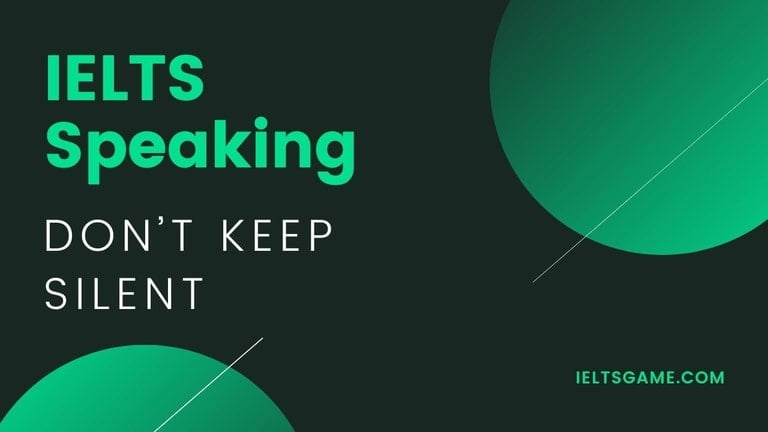IELTS Speaking: Don’t Keep Silent
Speaking is the shortest part of the IELTS test. However, it doesn’t mean that it is the easiest one.
This section consists of three tasks:
1 .In the first part of Speaking you will need to answer general questions about yourself.
2. The second task is the monologue on a given topic.
Here, you will have to talk for about two minutes without stops.
3. And in the last part you will answer the examiner’s questions again, but questions in this part are more difficult and they somehow relate to the topic you discussed in the second task.
What is important in Speaking exam?
This section assesses your ability to use a wide range of English vocabulary and grammar structures in the speech.
Also, you must express your ideas clearly and coherently without long hesitations.
It means that even if you don’t know what to say, you must speak.
Keep in mind that the test doesn’t check your knowledge of some particular subject (such as environment or economics).
It examines how well you can use English when you speak.
Test takers usually worry that they will not be able to answer this or that question.
Also, due to stress and tension, it is possible that you forget even your name! Don’t worry, I’m joking.
In fact, it can be quite challenging to find an answer to some of the questions.
Especially, it concerns the third part of Speaking where the topics for discussion are abstract and non-personal.
It may happen that you haven’t thought about this issue even in your native language and you have no ideas about it.
Let’s look at the example of some questions that students usually consider quite challenging:
- Do you agree that you should never meet your heroes?
- Which is more important, research or teaching?
- Why are elected politicians often so unpopular?
- How important are retirees to your country’s economy?
- When should you start saving for retirement?
- When can an image be worth a thousand words?
- Is a photograph a reliable form of identification?
However, there is a way to deal with the questions you are not familiar with.
Always remember that examiners assess your ability to speak, and they are not really interested in your awareness of different issues.
How not to keep silence during IELTS speaking exam?
First of all, you can use some “filler” phrases to acknowledge the question and to show the examiner that you are thinking about an answer.
In this case, you will win some time to make up an answer and show the examiner that you can use different grammar and vocabulary.
Here are some expressions that you can use to fill in the spaces when you need more time:
- That’s an interesting question!
- OK, well, let me see.
- In fact, I have never thought of this before, but I can assume…
- Well, let me think…
- I need some time to think about it.
Examples:
Look at the example:
Examiner: What kinds of possessions give status to people in your country?
Candidate: That’s a good question. Let me think… I would say that it mostly depends on where you are and who you are with.
If you are, let’s say, out in public, it’s things like the car you are driving.
If you have the latest BMW or Ferrari model, then in my country that is a sign of status, as most people can’t even afford a car at all.
Property, or the house you own, and the possessions you have in it are also a sign of status.
If you have a nice house in a nice area, then this shows you have money, and it makes you important
Also, you can always use your imagination when you answer a question.
If you have never dealt with some issue before, try to think of some ideas about it at the exam.
Don’t be afraid that your answer will be wrong, there are no correct or incorrect answers in IELTS Speaking.
Look at the example:
Examiner: Why do you think conversations between men and between women are usually different?
Candidate: Actually, I have never thought about this before.
Let me think… Maybe some people are more doers than thinkers, maybe men like to have a laugh more than women, although I like to have a good laugh with my friends too.
I guess if you studied all the conversations you would probably find that both men and women talk about the same things throughout their life – just at different times and in different ways – it’s because we’re all different; men think differently from women, there are some things which are more important to each of us, but we still talk about all the same important things – we just do it in different ways
As you see in this example, the candidate lets the examiner know that this topic is unfamiliar to him.
Anyway, he tries to speculate on the topic and gives quite a good answer.
Conclusion
To conclude, you shouldn’t be afraid of not being aware of some issue. Just try to say something and never be silent.
Also, you must practice a lot in answering different types of questions before the exam.
If you don’t have an IELTS tutor to train you, at least ask your English-speaking friend to talk with you.
Good luck!


One Comment on “How not to keep silence during IELTS speaking exam?”
I need a good IELTS tutor